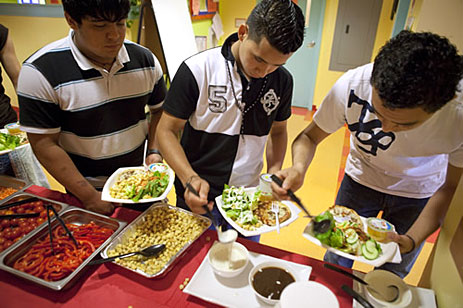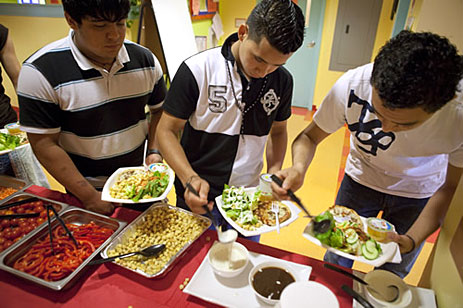 Students at D.C.’s Next Step Public Charter School visit salad bar provided by D.C. Central Kitchen’s contract-foods division.Photo: D.C. Central KitchenThe District of Columbia is about to embark on what may be the nation’s most unorthodox public-school food program: meals made from scratch, using locally grown ingredients, by a charitable social-services agency whose primary mission is feeding the homeless and teaching ex-offenders how to cook.
Students at D.C.’s Next Step Public Charter School visit salad bar provided by D.C. Central Kitchen’s contract-foods division.Photo: D.C. Central KitchenThe District of Columbia is about to embark on what may be the nation’s most unorthodox public-school food program: meals made from scratch, using locally grown ingredients, by a charitable social-services agency whose primary mission is feeding the homeless and teaching ex-offenders how to cook.
Beginning next week, the agency in question — D.C. Central Kitchen — will set up shop at Kelly Miller Middle School in Northeast Washington and get ready to start cooking meals for seven D.C. schools when classes resume Aug. 23. D.C. Central Kitchen was the winning bidder for one of two contracted pilot programs intended to provide some competition for Chartwells, the giant food-services company that has been providing meals of mostly processed convenience foods to the city’s 122 public schools for the past two years. Revolution Foods was chosen for the second project, catering “portable” meals to seven other schools.
As well as being the first time in recent memory that meals have been made from scratch in a D.C. school kitchen, the program represents the culmination of innovative efforts by D.C. Central Kitchen to build a successful economic model around concepts that one doesn’t usually associate together: local farming, job training for the down-and-out, and feeding the indigent.
Giving blemished local specimens a second chance
Founded by Robert Egger — the deep thinker who’s the subject of Grist’s ongoing series Egger’s Head — D.C. Central Kitchen for the last several years has been building relationships with farmers in Virginia’s Shenandoah Valley and using discount produce purchased there at auction to make the 4,500 daily meals it serves each day in local shelters and soup kitchens. But some of that produce has also been going into a wholesale food business that D.C. Central Kitchen has been quietly building on the side: selling fruits and vegetables at upscale grocers such as Wagshal’s in Friendship Heights, making pizza sauce for trendy We the Pizza restaurant on Capitol Hill, among others.
Arrangements like these give local businesses an opportunity to express their philanthropy as part of everyday commerce, rather than digging into their pockets to make a donation. The proceeds, along with income from the kitchen’s catering arm — Fresh Start Catering — help fund the kitchen’s other programs. In fact, the wholesale produce and processing business has grown so much at D.C. Central Kitchen that there’s no longer room for it at the charity’s facilities at 2nd and D streets NW. The kitchen, which had already extended its operating hours and rents freezer facilities in suburban Maryland, is about to expand into an additional 6,500-square-foot space.
The developments at D.C. Central Kitchen converge precisely with the public school system’s recent efforts to introduce fresher, healthier foods, as well as the “Healthy Schools Act” approved earlier this year by the D.C. Council, which not only raises nutritional standards for school food but provides bonus funding for every meal that contains a locally grown component.
Mike Curtin, D.C. Central Kitchen’s chief executive officer, said the charity wasn’t looking to expand into the schools, but felt an obligation to offer its unique and entirely self-created position in the nascent local food-distribution chain for the pilot project. He sees this as a chance to prove the validity of the organization’s model for building an economical, self-sustaining food community around local resources, an approach sparked by Curtin’s observation that the kitchen’s regular purchases of hothouse tomatoes flown in from Belgium seemed out of whack.
D.C. Central Kitchen now buys tons of local tomatoes — sometimes blemished or otherwise unsuitable for sale commercially — and freezes them by the bucketful for future use in sauces. He sees huge potential business in other products, such as prepared carrot sticks for school snacks, or an entire line of dried local fruits that could be used in cereals, muffins, and other goods. The kitchen also makes money transporting grass-fed meats from Shenandoah processors to local restaurants, and Curtin believes the less desirable cuts — such as beef chuck — could easily end up as burgers on cafeteria trays as part of a bartering arrangement with restaurateurs.
Curtin said he expects next year to begin making “contract purchases” from local growers, meaning telling farmers what kind of produce to grow and how much. Such innovations are fueling excitement as well as an atmosphere of creative thinking around the possibilities for alternative food production outside the nation’s capitol.
Kitchen ex-confidential
D.C. Central Kitchen’s bid for the pilot contract was “somewhat more” than the $2.70-per-meal benchmark the schools had set in their request for proposals, representing approximately the amount the federal government provides for a fully subsidized school lunch. In a rare instance of a local government stepping forward with extra money for school meals, the “Healthy Schools” act kicks in an additional 10 cents for each breakfast and each lunch served. Curtin said he figures about $1 of the total goes toward ingredients, leaving a profit margin of between 4 and 6 percent for D.C. Central Kitchen — close to the industry average.
He said the charity’s off-premise work is more expensive than competitors’ because D.C. Central Kitchen pays its workers more. Cooks at D.C. Central Kitchen start at $12.50 per hour, compared to an industry average of $8 to $10 per hour, Curtin said. In addition, the kitchen pays 100 percent of the cost of health care, along with disability and life insurance, vacation and a 50 percent matching contribution to retirement savings. In the deal with D.C. schools, there’s just one hitch: the kitchen can’t use most of the cooks it trains, because so many of them are convicted felons. D.C. Public Schools provided a long list of criminal categories it would not accept in settings populated mostly by children. Sex offenders and pedophiles already are excluded from D.C. Central Kitchen’s training program, according to Curtin.
The issue has come up before. When D.C. Central Kitchen was negotiating its contract to cook meals at the Washington Jesuit Academy — a private school for at-risk boys in Northeast Washington — board members there also raised concerns about the criminal backgrounds of the kitchen staff. But Curtin said he told them “that was a deal breaker,” and the academy agreed to give it a try. So far, Curtin said, there have been no untoward incidents. Some of the cooks have even become mentors and role models for the students. The issue of giving second chances to offenders who have served their time, Curtin says, is one that deserves wider public debate.
“The food is the easy part”
of the new pilot program, Curtin said. “The staffing issue is the hurdle.”



